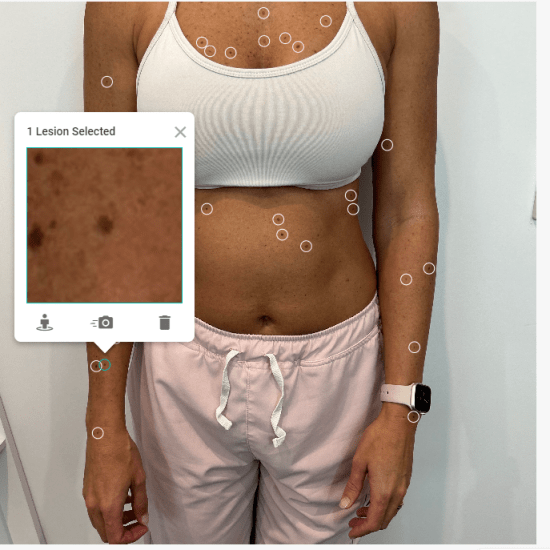Taking care of your skin isn’t just about looking good
The skin is the body’s largest organ and is the first line of defence against the sun, pollutants, and extreme temperatures.
Educating patients on the importance of protection from solar damage, and changes to existing moles is essential to early detection, diagnosing, treating and managing ongoing skin conditions and is key to saving your life.
An annual skin check should be on everyone’s calendar and there is no better time than now to arrange an appointment that can save your life. Dr Paula Hade and Dr Megan Kelly are her Medical onsite specialists ready to take care of you and help with any concerns on new or existing moles you may have.
Skin Checks
Understand your skin and be familiar with what is usual for you. If you observe any new skin spots or alterations in the color, size, or shape of existing spots, promptly consult your general practitioner (GP). Your GP, being acquainted with your complete medical history, can offer guidance on whether a surveillance and management plan is necessary. Early detection is vital, as most skin cancers can be effectively treated when identified early.
For individuals at a heightened risk of skin cancer, regular professional skin examinations are essential, complemented by consistent self-monitoring for any changes in the skin. Certain high-risk individuals may be presented with the option of total body photography by their doctor.
People are classified as high-risk if they:
• are male and aged over 50 years
• have a history of previous skin cancer
• possess numerous moles, particularly if some are sizeable or exhibit unusual characteristics
• have experienced significant sun damage in the past
• have a notable family history of skin cancer
• are on immunosuppressive medications
• have a genetic syndrome involving the inheritance of melanoma through family genes.

Dr Paula Hade
Dr Paula Hade areas of interest include all areas of women’s health, antenatal care, children’s health, preventive health and skin health.

Dr Megan Kelly
Dr Megan Kelly is an experienced FRACGP General Practitioner with a special interest in skin cancer medicine.
Do you know your skin type?
Skin Sense
![Image[6]](https://hermedical.com.au/wp-content/uploads/2022/08/Image6-550x550.jpeg)
Skin Sense
Skin Sense
Australia has the highest rate of skin cancer in the world with Queensland holding the highest rate across Australia and has the highest rate of diagnosed melanoma cancer in the world.
Any new moles or changes in size, shape or colour of any existing moles should be examined immediately. Certain lifestyles along with different skin types may be at a higher risk than others and include:
- Fair skin, hair or red hair and blue eyes
- A large number of moles
- Working outdoors
- Using solariums, sunlamps and sunbeds
- Family history

Dr Megan Kelly

Dr Paula Hade
Total Body Photography

Total Body Photography
Total Body Photography (TBP) is a comprehensive imaging technique used by Dr Megan Kelly to capture high-resolution photographs of a patient’s entire body, including the skin’s surface. TBP is especially valuable for tracking changes in moles, identifying skin conditions, and monitoring skin health. It’s an essential tool in skin cancer screening and long-term dermatological care.
Benefits:
- Early Detection: TBP enables the doctro to identify skin abnormalities at an early stage, making it crucial in the early detection of skin cancers such as melanoma.
- Baseline for Monitoring: By creating a baseline of a patient’s skin condition, doctors can compare new images over time to detect any changes or potential issues.
- Precision and Documentation: TBP provides detailed, standardised documentation, ensuring that nothing is missed during skin examinations.
- High-Resolution Imaging: Modern TBP systems use high-resolution cameras, capturing intricate details of the skin’s surface.
- Reduced Biopsies: TBP may reduce the need for unnecessary skin biopsies, as it helps doctors focus on specific areas of concern.
- Patient Education: It’s a valuable tool for patient education, allowing them to see their skin condition and better understand their dermatological health.
- Risk Assessment: TBP can help assess a patient’s risk factors for skin cancer, allowing for more personalized care.
- Streamlined Workflow: In dermatology practices like “Her Medical,” TBP can streamline the patient workflow and improve the efficiency of skin exams.
- Data Management: With digital TBP, images are stored electronically, making it easier to access and manage patient records.
- Peace of Mind: For patients in regions like the Gold Coast, where sun exposure is common, TBP can provide peace of mind through regular skin monitoring.
Overall, Total Body Photography is a powerful tool in dermatology that contributes to early diagnosis and effective management of skin conditions, particularly in areas where sun exposure is a concern.
